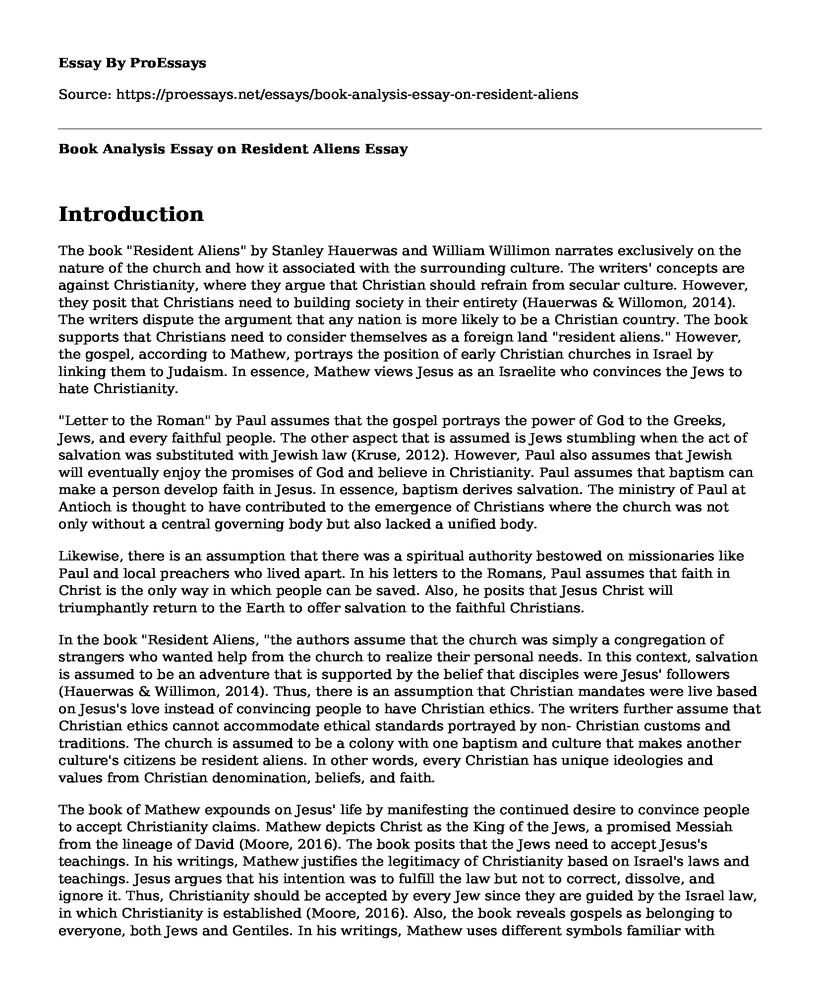Introduction
The book "Resident Aliens" by Stanley Hauerwas and William Willimon narrates exclusively on the nature of the church and how it associated with the surrounding culture. The writers' concepts are against Christianity, where they argue that Christian should refrain from secular culture. However, they posit that Christians need to building society in their entirety (Hauerwas & Willomon, 2014). The writers dispute the argument that any nation is more likely to be a Christian country. The book supports that Christians need to consider themselves as a foreign land "resident aliens." However, the gospel, according to Mathew, portrays the position of early Christian churches in Israel by linking them to Judaism. In essence, Mathew views Jesus as an Israelite who convinces the Jews to hate Christianity.
"Letter to the Roman" by Paul assumes that the gospel portrays the power of God to the Greeks, Jews, and every faithful people. The other aspect that is assumed is Jews stumbling when the act of salvation was substituted with Jewish law (Kruse, 2012). However, Paul also assumes that Jewish will eventually enjoy the promises of God and believe in Christianity. Paul assumes that baptism can make a person develop faith in Jesus. In essence, baptism derives salvation. The ministry of Paul at Antioch is thought to have contributed to the emergence of Christians where the church was not only without a central governing body but also lacked a unified body.
Likewise, there is an assumption that there was a spiritual authority bestowed on missionaries like Paul and local preachers who lived apart. In his letters to the Romans, Paul assumes that faith in Christ is the only way in which people can be saved. Also, he posits that Jesus Christ will triumphantly return to the Earth to offer salvation to the faithful Christians.
In the book "Resident Aliens, "the authors assume that the church was simply a congregation of strangers who wanted help from the church to realize their personal needs. In this context, salvation is assumed to be an adventure that is supported by the belief that disciples were Jesus' followers (Hauerwas & Willimon, 2014). Thus, there is an assumption that Christian mandates were live based on Jesus's love instead of convincing people to have Christian ethics. The writers further assume that Christian ethics cannot accommodate ethical standards portrayed by non- Christian customs and traditions. The church is assumed to be a colony with one baptism and culture that makes another culture's citizens be resident aliens. In other words, every Christian has unique ideologies and values from Christian denomination, beliefs, and faith.
The book of Mathew expounds on Jesus' life by manifesting the continued desire to convince people to accept Christianity claims. Mathew depicts Christ as the King of the Jews, a promised Messiah from the lineage of David (Moore, 2016). The book posits that the Jews need to accept Jesus's teachings. In his writings, Mathew justifies the legitimacy of Christianity based on Israel's laws and teachings. Jesus argues that his intention was to fulfill the law but not to correct, dissolve, and ignore it. Thus, Christianity should be accepted by every Jew since they are guided by the Israel law, in which Christianity is established (Moore, 2016). Also, the book reveals gospels as belonging to everyone, both Jews and Gentiles. In his writings, Mathew uses different symbols familiar with Jewish tradition to depict the image of Jesus. Through these symbols, the Jews are briefed that Jesus Christ was the intended Messiah.
References
Hauerwas, S., & Willimon, W. H. (2014). Resident Aliens: Life in the Christian Colony (Expanded 25th Anniversary Edition). Abingdon Press.
Kruse, C. G. (2012). Paul's Letter to the Romans. Wm. B. Eerdmans Publishing.
Moore, T. (2016). The Book of Matthew: A New Translation with Commentary-Jesus Spirituality for Everyone. SkyLight Paths Publishing.
Cite this page
Book Analysis Essay on Resident Aliens. (2023, Apr 28). Retrieved from https://proessays.net/essays/book-analysis-essay-on-resident-aliens
If you are the original author of this essay and no longer wish to have it published on the ProEssays website, please click below to request its removal:
- A Literary Essay sample. Ray Bradbury's There Will Come Soft Rains
- The Yellow Wallpaper: Suppression of Women in the 19th Century and Escape
- Travels With Charley in Search of America Paper Example
- Essay Sample on Theme of Slavery and Freedom in Works Written During the Antebellum Period
- The Wife of Bath by Chaucer Essay Example
- The Fall of the House of Usher Analysis Paper Example
- "When the Lights Went Out" Review Paper Example







